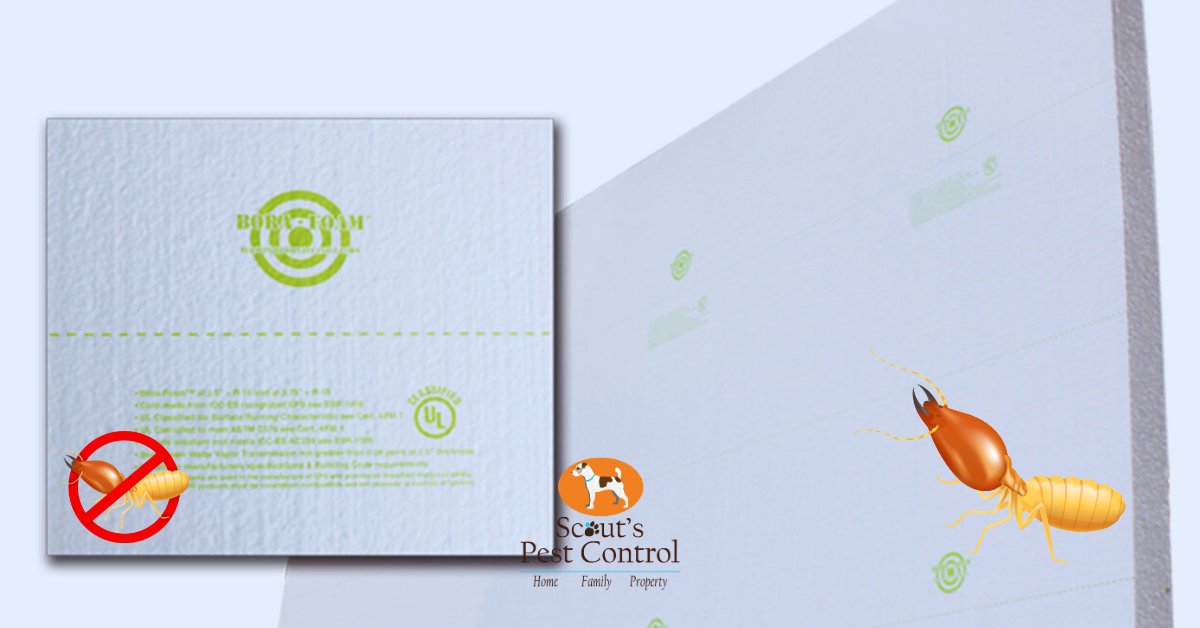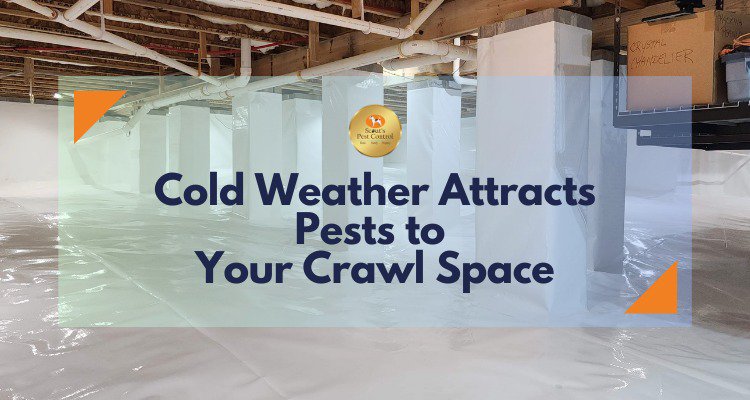The widespread use of spray foam in pest control for termite prevention and crawl space insulation is causing concern. Concerns about its limits are growing with the phenomenon’s rising popularity. Several issues, including insufficient insulation and unanticipated termite infestations, have driven the hunt for better options. In fact, the reality is that your spray foam insulation offers the perfect environment for termites to survive and thrive. Bora Foam is a formidable competitor due to its impressive insulation properties and natural resistance to termite infestations. We discuss the problems with spray foam and explore the potential benefits of bora foam as an alternative insulation. We aim to provide readers with important information to help them make informed decisions about their insulation needs.
Issues with Spray Foam Crawl Space Insulation
Spray foam crawl space insulation has been marked as an innovative approach, promising greater energy efficiency and household financial savings. However, as we learn more about the insulation industry, we have uncovered some serious dangers that this material poses, especially when it comes to protecting your home against termite infestations:
Termite Infestation Issues

Termite infestations in homes with spray foam insulation have become an increasing concern for many homeowners. Despite the durability and energy efficiency of spray foam, its unintended consequence as a potential attractant for termites has raised alarms. The petrochemicals in spray foam, which are thought to be a possible food source for termites, can lead to serious pest issues.
AA study by the Mississippi State University Extension Service on the impact of Spray Foam Insulationstudy by the Mississippi State University Extension Service 2018 discussed a marked increase in termite activity in homes with certain types of insulation, including spray foam. The study found that homes with spray foam in their crawl spaces had a higher incidence of infestation than those without.
Compounding this issue is the hesitancy of pest control companies to treat homes that has spray foam insulation installed, because that is an attractant for termites. In fact, many pest control companies have refused to treat a home because of this.
Legally, this puts homeowners in a precarious situation. Most states require homes to have some form of termite protection, either through a bond or a treatment plan. The refusal of pest control services to treat these homes not only risks the integrity of the property but also puts homeowners at odds with legal requirements for pest management.
So, while spray foam insulation offers numerous benefits, homeowners must weigh these against the potential risks of termite infestation and the practical challenges in remediation.
Further Problems
There are a plethora of other problems that compound matters. However, another solution is available when you opt to encapsulate your crawl space, and it is resistant to termite infestations. More about that later.
Inadequate Crawl Space Insulation

Spray foam insulation is attractive because it effectively insulates and seals cracks and openings. However, its usefulness may be limited in specific places. The “one-size-fits-all” claims made for spray foam aren’t always accurate. It may not be sufficient in freezing or hot climates to provide adequate insulation to keep homes warm or cool. Improving energy efficiency requires a close look at these gaps.
Environmental Concerns and Impacts
Concerns about spray foam’s environmental impact have emerged amid a growing movement towards eco-friendlier and sustainable practices. The waste material of the spray foam is hazardous to the earth’s health and possibly human health.
Additionally, there are also safety and environmental concerns related to the wastage of some compounds during application. In light of the growing environmental consciousness, it is imperative that we explore insulation options that align with our eco-friendly aspirations.
Cost Considerations
When it comes to insulation choices, the cost of spray foam insulation tends to be notably higher than that of traditional alternatives such as fiberglass or cellulose. While the upfront expense may initially give homeowners pause, it’s essential to view this investment through a long-term lens, especially in light of potential termite infestations.
Spray foam insulation is undeniably an investment, and its higher price tag can deter some budget-conscious homeowners. However, it’s crucial to recognize that this initial cost often translates into substantial long-term savings and benefits. By creating an airtight seal and significantly reducing energy loss, insulation can lead to remarkable energy efficiency improvements in your home.
The Long-Term Viability:
- Energy Savings: Spray foam insulation’s superior insulating properties mean that your home will require less heating and cooling, leading to reduced energy consumption and lower utility bills year after year.
- Durability: Unlike traditional insulation materials that may degrade over time, spray foam insulation maintains its effectiveness and integrity, ensuring long-lasting thermal protection.
- Termite Resistance: Spray foam is not a viable as a method to repel termites and therefore may not be the best choice. The alternative is available with Bora Foam.
When evaluating the cost of foam insulation, it’s essential to consider not only the immediate expense but also the significant advantages it offers over time. This insulation option isn’t just about upfront affordability; it’s a long-term investment in your home’s comfort, energy efficiency, and resilience against potential termite threats.
Aging and Maintenance
Degradation or shrinkage of spray foam insulation over time may cause insulation gaps. Regular maintenance or reapplication is necessary to ensure the long-term effectiveness of the product. Homeowners must perform the additional upkeep to maintain the product’s performance.
Flammability
Spray foam insulation is highly flammable and poses a significant fire risk if it’s not adequately covered or protected. Ensuring the safety of your property and those nearby is paramount when using spray foam. It is essential to take all necessary precautions, such as applying fire-resistant coatings or covers.
As we further explore the topic of insulation, it becomes clear that despite spray foam’s supposed benefits, the material is not without problems. Problems with termites, insulation, and the environment doubt its universal applicability.
When looking for the best insulation, it’s important to have an open mind and examine options like bora foam, which shows promise in addressing these issues.
Bora Foam: The Ideal Solution
Bora Foam is quickly becoming a household name in the insulation industry due to its advantageous properties. As we move further in our investigation of the insulating mystery, the tremendous advantages of Bora Foam must be brought to light. The one main advantage for pest control is that Bora Foam actually repels termite infestations and this is a better solution to protect your home investment.

Superior Insulation
One of the key characteristics of Bora Foam lies in its great insulating capabilities. Bora Foam is a reliable protector against temperature changes, unlike traditional spray foam insulation, which may not work as well in some settings. Because of its unique composition, it provides an excellent thermal barrier that blocks heat transfer with remarkable efficiency. The result is a more pleasant interior and lower energy bills, making Bora Foam the insulation of choice.
Termite-Resistant
For a long time, homeowners’ worst nightmare has been fighting off termites and repelling termite infestations. However, the use of Bora Foam puts an end to this horror. Bora Foam is made with materials resistant to termites so that those pesky insects won’t damage it. The environment for survival does not exist. The compounds in Bora Foam repel and do not attract termites, making this the ideal solution.
You no longer need to stress over termite infestations, repairs, or any other associated costs. Bora Foam not only insulates your home better than anything else on the market, but it also protects you and your family from the destructive forces of nature.
Eco-friendly
The commitment to sustainability and eco-friendliness is a trademark of Bora Foam. Bora Foam is a good option for eco-conscious consumers because it has little environmental impact. It’s made with eco-friendly methods and doesn’t use any potentially hazardous materials in the production process. Bora Foam is an investment in your comfort and a vote for a healthier, more sustainable planet.
Cost-Effective
Bora Foam insulation may have a higher upfront cost than other types of insulation, but its long-term savings more than make up for the difference. Saving money on heating and cooling costs is just one side effect of its excellent insulating qualities. It can also keep termites away, saving homes much money on pest control and repairs. Bora Foam’s long-term savings become obvious, making it a financially sensible choice.
Bora Foam At A Glance
We have discussed the benefits of Bora Foam and why this should be your insulation and termite resistant choice for your home. Have a look at the overview and contact scouts to book your free crawl space inspection.
- Resistant to termite damage
- Vapor permeance ≤0.08
- Provides R-10 insulation
- Safe for handling and noncorrosive
- Puncture resistant
- Easy cut lines
- 3 mil polyethylene on the front side and 2.5 mil polyester on the back side of board
- 3/4 cut & snap can create inspection flap
- Won’t cut your hands like foil products
- No itch from fiberglass
- Meets ICC ES AC239 requirements for termite resistance foam plastic
- Is suitable for use in all areas of termite risk
- 100% recyclable and made using 10%-15% recycled content
- Meets requirements of IBC Section 2603.8
- Meets requirements of IRC Section 320.5
Final Verdict

If you want to protect your home against termites and at the same time, have the best insulation in your crawl space, make the right choice. Bora Foam stands head and shoulders above the competition regarding home insulation. It is the best option because of its outstanding insulating effectiveness, uncompromising resistance to termites, and eco-friendly construction. You must give serious consideration to these evident advantages.
Choosing Bora Foam not only ensures a more pleasant and affordable abode but also puts you in step with a more ethical and eco-friendly future.
When you invest in Bora Foam, you’re not simply protecting your home from the chill; you’re also making a sustainable, ethical choice for its future.





